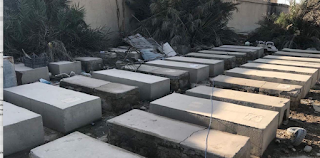
The proposed mass kiddush for Jews buried in Arab lands should be recited by Ashkenazi synagogues as well as congregations from the Middle East and North Africa. It is an opportunity to end the perception that the history and culture of Mizrahi Jews is ‘other’, argues David A Dangoor in the Jerusalem Post:
Baghdad Jewish cemetery: prayers will be positive and cathartic
As a result of the majority’s attitudes, culture and history, little is known of the Jewish communities of the Middle East and North Africa. Its history, culture and traditions are rarely studied at Jewish schools or other educational institutions, even in Israel.
Some, like Prof. Daniel Elazar, who contributed much to the academic study of Sephardim, described these communities as “The Other Jews.” Elazar, writing in 1989, meant this term as an implicit dig against those who saw these communities as the “others,” stressing how the Ashkenazi Jews were the main protagonists of Jewish history and culture.
Three decades later, it is time to end this othering of Middle Eastern and North African Jews and place their history, culture and tradition on an even keel.
On November 30, for the second year running, prayers will be recited in synagogues across the world in remembrance of Jews buried in inaccessible cemeteries in Arab lands. A mass hashkaba (kaddish), at the initiative of a Montreal resident of Iraqi origin, Sass Peress, will be said. For decades, families have been prevented from reciting prayers at the gravestones of their loved ones buried in Arab lands.
Peress said that the hashkaba and prayers help “to create a positive and cathartic event for all.” Last year, only 12 synagogues in the world took part in this historic event; four times that number are expected to join this year. Nonetheless, most, if not all of these synagogues and communities are from the Middle Eastern and North African tradition.
To make this a truly positive and cathartic event, it would be extremely gratifying to witness other communities without these origins stand shoulder to shoulder in Jewish solidarity to remember the Jewish communities that were decimated in that part of the world.
In February, the Exilarch’s Foundation sponsored a special event at the historic Bevis Mark Synagogue to mark 50 years since the infamous Baghdad hangings, when nine Jews and others were publicly hanged, an event that spurred the remaining Jews of Iraq to flee.
Bevis Marks is the oldest synagogue in the United Kingdom. Its Spanish and Portuguese founders had no immediate roots in the region, so it was deeply heartwarming that such a Jewish community joined in the occasion to make it a shared point of commonality. For those of us whose roots are in in Iraq and the Middle East but live in an Ashkenazi majority community, it is vital that the barriers between our different communities are broken down.
This will only happen if there is a greater sense of awareness of the history, culture and tradition of other communities. With knowledge comes understanding, and the lines that separate us will begin to blur and disappear. We need literacy in the history and culture of each and every Jewish community to be passed down as the previous generations leave us.
Read article in full

Leave a Reply